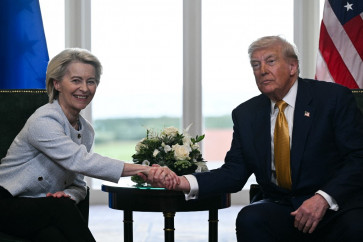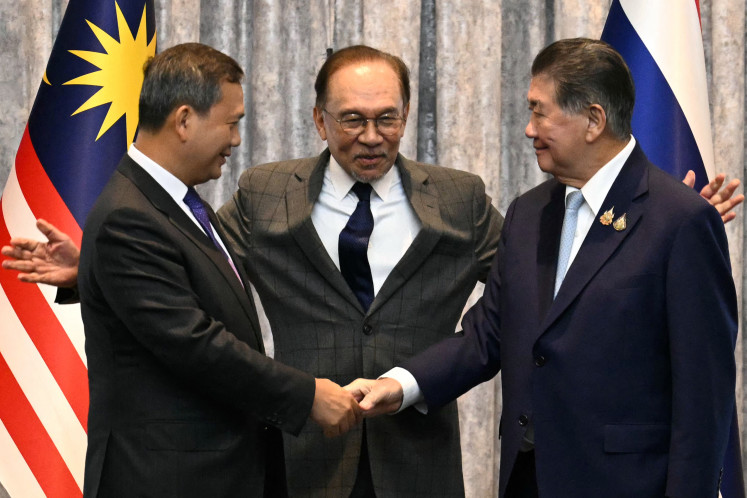Popular Reads
Top Results
Can't find what you're looking for?
View all search resultsPopular Reads
Top Results
Can't find what you're looking for?
View all search resultsExpanding triumvirate to quintumvirate
JP/Seto WardhanaAs the newly elected members of the People’s Consultative Assembly (the Assembly) begin the 2019-2024 term, the revision of the 1945 Constitution has become an increasingly hot topic
Change text size
Gift Premium Articles
to Anyone
JP/Seto Wardhana
As the newly elected members of the People’s Consultative Assembly (the Assembly) begin the 2019-2024 term, the revision of the 1945 Constitution has become an increasingly hot topic. This issue currently involves the restoration of the Assembly's authority to reintroduce the State Policy Guidelines (GBHN) and to fully repeal the amendment of the 1945 Constitution, which means returning back to the original document. This issue can actually be understood as an effort to restructure the state’s authority.
If this assumption is proven to be true, then we should not overlook one specific issue related to the amendment; to what extent can our laws respond to a potential constitutional or political crisis in the coming years? Furthermore, will the adopted conception of a triumvirate be able to ensure the continuation of government? These reflective questions are closely linked to the triumvirate concept enacted in Article 8 (3) of the 1945 Constitution, which regulates the succession line of national leadership.
The triumvirate concept in the 1945 Constitution sets out the line of succession system for national leadership. If the sitting president and vice president are permanently unable to perform their duties, the presidential line of succession follows the order of three main political actors: the home minister, defense minister and foreign minister. The main objective of this concept intends to guarantee continuity of government in the event of a constitutional or political crisis, to prevent a power vacuum in government.
In the newly formed Cabinet, the ministers are, respectively, former National police chief Gen. Tito Karnavian, former Special Forces chief and former presidential candidate Prabowo Subianto and Retno LP Marsudi.
Article 8 in the original document of the 1945 Constitution did not include a provision that detailed the line of succession in the event of a power vacuum. Only after the amendment of Article 8 was an additional clause included that regulates this specific issue.
This topic is closely related to the history of constitutional laws during the Indonesian national revolution period from 1945 until 1949. The second Dutch “military aggression” brought down the national government, captured the capital and even seized the state leaders and officials. To address the power vacuum at that time, an emergency government was formed in West Sumatra from 1948 to 1949. Learning from that historical event, it was understood there was an urgent need to form a principal to respond to such a constitutional crisis, with the principle later included in the fourth amendment of the 1945 Constitution.
Therefore, the inclusion of paragraph (3) of Article 8 in the Constitution was actually an effort to institutionalize this previous constitutional practice, to ensure the government continues to function in the event of a constitutional emergency.
However, to address future challenges that could pose threats and result in a constitutional emergency, it was necessary to amend Article 8 (3) of the 1945 Constitution. The most common threats include national disasters or economic crisis. Those two challenges can potentially disrupt political stability, possibly leading to a constitutional and political crisis. Thus, if this was to happen, it could be difficult to maintain the continuity of government due to the inability of the triumvirate concept to respond to the crisis.
Consequently, it is necessary for the planned fifth amendment of the 1945 Constitution to cover Article 8 (3). This amendment will add two new positions in addition to the three ministers — the finance minister and the attorney general, positions currently held by the incumbent Sri Mulyani Indrawati and ST Burhanuddin, respectively.
By adding these two positions, the triumvirate is expanded to a quintumvirate, with five political actors in the line of succession.
There are two reasons why the finance minister and the attorney general should be added to the quintumvirate. First, the national economy and economic resilience are vital to the continuity of government. Second, the appointment of the attorney general in the line of succession would ensure law enforcement and social order in the event of a constitutional emergency.
Thus, with the expansion of the triumvirate to a quintumvirate, it is hoped the government would continue to function in the event of an emergency to ensure the safety of the people and the country.
However, even if this change were to be made, another problem arises in regard to the right criteria for determining these positions. The holders of these positions should meet the criteria so as to ensure the government can cope with a crisis in the 30 days before the Assembly elects a new president and vice president.
Fundamentally, the positions in the triumvirate or quintumvirate require people with the best qualities and capacities, including a good track record and integrity. In addition, the people who will fill these positions also need to have a clear ideology, in the sense that they must be able to defend the values of democracy based on the state ideology Pancasila in a time of crisis.
The positions in the line of succession have now become more relevant considering that Jokowi recently announced his new Cabinet for his second term. The figures who will fill the triumvirate positions are holders of the constitutional mandate related to the continuity of government in the event of a constitutional crisis.
Therefore, not only should the positions be given to people with the necessary capabilities and integrity, they also need to possess the quality and value of sunyasa, a Sanskrit principle that dictates a person should set aside his or her personal interests for the common good of the people.
______________________
Political and social affairs researcher, Centre for Strategic and International Studies Jakarta (CSIS Jakarta)










